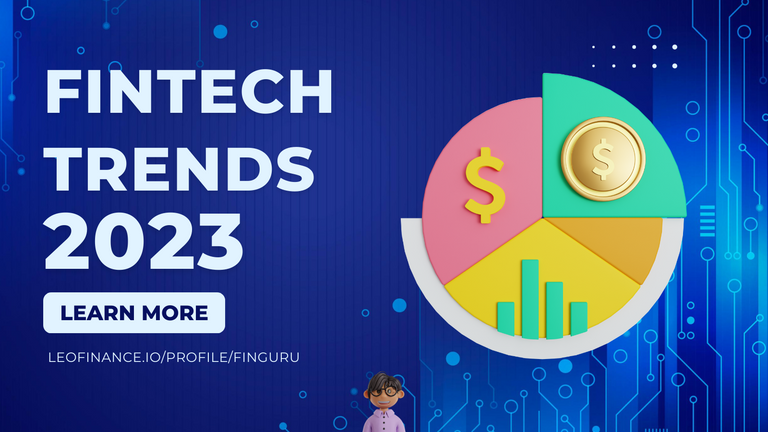
As someone who's always been fascinated by the intersection of technology and finance, I've spent considerable time tracking the progress of financial technology (Fintech) in 2023. From AI to Blockchain, the pace of innovation in this field is dizzying and we are moving too fast. It's getting hard to keep up. As we stand in the year 2023, I'm eager to share my findings with all of you on the Fintech trends that are shaping the world of finance as we know it. Let's go!!
Fintech Trends 2023
AI and Machine Learning -
AI and machine learning are becoming increasingly integral to the fintech landscape. With their ability to process and interpret vast amounts of data quickly and efficiently, they're powering everything from chatbots to risk assessment to financial management. Their potential in automating tedious tasks and providing personalized customer experience is truly a game-changer.Embedded Finance in Banking -
The concept of embedded finance is turning heads in the banking sector. Imagine your everyday non-financial apps integrating financial services seamlessly. Businesses are incorporating banking solutions within their existing products, and it's clear to see the transformative potential this has on user experiences.SaaS -
Software as a service (SaaS) models are playing a prominent role in fintech. The advantage of SaaS includes lower costs, scalability, and enhanced efficiency. They are poised to become even more impactful in shaping the industry, given the benefits and flexibility they offer.Open Banking -
Open banking continues to be a hot topic. By leveraging APIs, third-party financial service providers can access consumer financial data, fueling innovation and increasing competition. In essence, it's a revolutionary trend, bringing the power back to the consumer.Buy Now Pay Later (BNPL) -
"Buy now, pay later" schemes have surged in popularity, providing consumers with more flexible payment options. BNPL services offer immediate financing for consumers, which can be repaid in subsequent installments. These options offer convenience and are shaping consumer purchase behaviors.IoT's Potential Role in Fintech -
The Internet of Things (IoT) is seeping into fintech, offering incredible potential. IoT devices collect data and provide insights into consumer behavior, allowing financial service providers to deliver more personalized services. With every connected device, we're stepping towards a more intuitive financial world.Blockchain Technology -
While Blockchain has been around for some time, its relevance in fintech is as significant as ever. It's driving innovations in areas like digital currencies and smart contracts. The promise of a secure, decentralized ledger system has the potential to reinvent several facets of financial transactions.Neobanking -
Digital-only banks, or Neobanks, are gaining ground. Providing a range of services, from savings accounts to loans and investments, Neobanks are proving to be a compelling, convenient alternative to traditional banking, promising a new age of banking that's faster and more accessible.RegTech -
Regulatory technology, RegTech, is an essential part of fintech, using technology to simplify compliance with regulations. Automating compliance tasks and managing risks efficiently, RegTech is proving to be a boon for financial service providers navigating complex regulatory landscapes.Cybersecurity and Fraud Prevention -
With growing digital finance comes growing risk. Cybersecurity and fraud prevention have never been more vital. Financial service providers are investing heavily in technologies like biometrics and machine learning to prevent fraud, safeguard customer data, and maintain trust in the digital ecosystem.Decentralized Finance -
Decentralized Finance, or DeFi, is bringing a new wave of transformation. It uses blockchain to create financial applications that operate without intermediaries. By offering transparency, accessibility, and security, DeFi is poised to revolutionize traditional finance, providing users with more control over their financial transactions.
Conclusion
The fintech industry is a hive 😉 of innovation, with each year bringing fresh trends that push the boundaries of what's possible in finance. Personally, I think this dynamic field holds a lot of promise for creating a more inclusive, efficient, and secure financial future. As we watch these trends unfold and evolve in 2023, I can only imagine what exciting developments await us on the horizon. With AI and Blockchain taking over the world, fintech will be taken to a whole new level. Are you ready for it? Comment below with your thoughts.
Posted Using LeoFinance Alpha
The rewards earned on this comment will go directly to the people ( finguru ) sharing the post on LeoThreads,LikeTu,dBuzz.https://leofinance.io/threads/finguru/re-leothreads-2bpaumrd2
Discord Server.This post has been manually curated by @bhattg from Indiaunited community. Join us on our
Do you know that you can earn a passive income by delegating to @indiaunited. We share more than 100 % of the curation rewards with the delegators in the form of IUC tokens. HP delegators and IUC token holders also get upto 20% additional vote weight.
Here are some handy links for delegations: 100HP, 250HP, 500HP, 1000HP.
100% of the rewards from this comment goes to the curator for their manual curation efforts. Please encourage the curator @bhattg by upvoting this comment and support the community by voting the posts made by @indiaunited..
This post received an extra 7.64% vote for delegating HP / holding IUC tokens.
I'll be ready! I think fintech will play a pivotal role in bringing about financial inclusion where anyone has access to basic financial services at affordable costs or even free. Business models will have to evolved when everything starts to become more free. Great trends that are converging in the financial landscape. Thanks for the educative post :)
Those are some nice trends but I think things like buy now, pay later are bad for people's finances. It doesn't bode well for people to get into debt to buy something they can't afford.